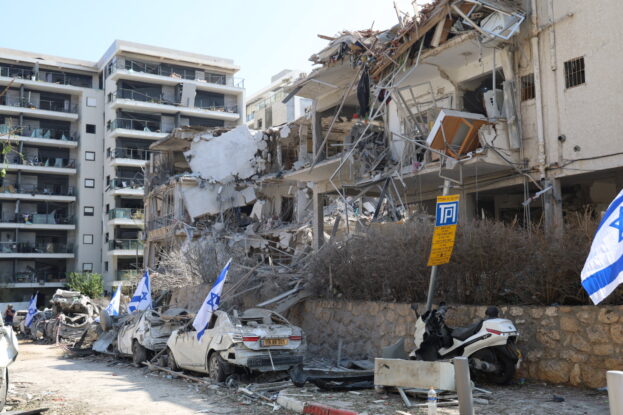Home Front Command guidelines state that only “essential activity” may take place today, with most of the construction sector not classified as such. The Chairman of the Tel Aviv Contractors Association said, “We saw the footage—where there were bomb shelters, lives were saved. There’s a long warning time before impact, and there’s no reason workers shouldn’t be on the job.” The Renovation Contractors Association has approached the Director General of the Ministry of Housing to request that contractors be allowed to operate at full capacity during a state of emergency.
By Doron Breitman, Nadlan Center
Against the backdrop of the war that broke out this past weekend between Israel and Iran, the Israel Builders Association distributed Home Front Command guidelines to its members on Saturday evening. These guidelines address safety protocols for construction work and requirements for bomb shelters at building sites and in open spaces.
According to the Home Front Command’s tier system, the entire country is currently under “essential activity only” status (marked red), which means that physical presence must be limited to the minimum required for vital activity. Excavation work, as well as the use of cranes and tower cranes, is prohibited. Notably, unlike during COVID, the construction sector is currently not classified as essential.
According to Amit Gottlieb, Chairman of the Tel Aviv and Central District Contractors and Builders Association, “Any site that complies with Home Front Command regulations should be allowed to operate—and as much as possible. Sites that don’t meet the requirements should be assisted in doing so. We’re talking about alerts that give us 10 to 15 minutes, not just 90 seconds. That’s enough time to reach shelter. If there’s a municipal bomb shelter nearby, you can run a drill right now on-site to see how long it takes to get there. There are solutions for everything. Municipalities need to help contractors now more than ever—approve housing units quickly and expedite access to sites, especially for pinui-binui projects.”
“The photos from the impact sites show the bomb shelter cores still standing,” he continued, “people survived and are alive. I don’t know what would have happened to those buildings without bomb shelters. A shelter not only protects those inside—it reinforces the structure. It can prevent a building from collapsing. This is life-saving. We know this with 100% certainty—we’ve seen the results. We’ve spent years in committees, pleading not to waste time fighting over one more unit. We need to build, renew, demolish, and rebuild projects that are earthquake-resistant and include bomb shelters. Instead, we’re bogged down with architectural aesthetics and nonsense.”
Regarding foreign workers, Gottlieb added, “Instructions not to go to work or keep sites closed are very serious mistakes. It should be the opposite. We need to consider the foreign workers who came here to earn a living. Now they’re not working, and they’re scared for their lives. We must get them back to work as soon as possible. People need to be active, not sitting at home watching TV, consumed by fear.”
“Anything that wasn’t a concrete wall didn’t survive.”
Yossi Hasson, CEO and founder of MyTown, described the confusion in the industry this morning: “There are still no clear guidelines. During COVID, real estate was classified as essential, but now no one really knows how it’s classified. Everything still feels chaotic. The sites I know aren’t operating. I think inspectors aren’t allowing it either—that’s the guidance I’ve received. We know there’s a certain adjustment curve, like during COVID when there was a full lockdown, and then gradually essential sectors reopened. I expect that soon, they’ll start clarifying who can operate and start reopening parts of the economy—including construction. Meanwhile, we’ve been in a war for a year and 8 months, and no one has addressed project delays, which are significant. The Builders Association asked for a 9-month grace period, and no one has responded yet.”
“We’re seeing break-ins at construction sites and equipment theft—these are dangerous times. The near-total halt in construction will affect the industry in many ways, including building costs and timelines. Even after restrictions lift, it will take days to restart operations, and the full impact will only be felt later.”
Ido Fadlon, CEO, Shponder & Fadlon Group
“I don’t think we’ve ever had such clear examples of the importance of bomb shelters. There are endless photos and examples. Anything that wasn’t reinforced concrete didn’t survive. Look at the building in Bat Yam—it had no bomb shelter, no reinforced concrete walls, and where it wasn’t hit, everything was still destroyed. We’ve never seen live evidence like this of how crucial reinforced safe rooms are—something old buildings just don’t have. It highlights once again the urgent need for proper protection.”
Regarding site operations, Hasson said, “Once the Home Front Command gives three levels of alerts, and the first one gives 20 to 30 minutes advance notice—that’s enough time to reach shelter. Even the second level provides about 10 minutes, which is still plenty. I think it’s possible to define protected areas on-site and put the responsibility on contractors to identify and direct workers to those locations. It’s not complicated—and I think it will happen.”
“Almost total halt”
“The current security situation presents an unprecedented challenge to the construction industry,” said Ido Fadlon. “Most sites across the country are closed by Home Front Command order, and the new guidelines significantly limit crane operations and work in open spaces. Only about 5% of projects—mainly those nearing completion and awaiting the final Occupancy Authorization Form (Tofes 4)—have been certified by the Home Front Command to operate due to their bomb shelters.”
He explained, “The impact is severe. During the war, we were already operating at about 60% capacity due to worker shortages. Now, it’s almost a total halt. Sites that aren’t approved per Home Front Command regulations cannot operate. Crane operators can’t reach protected bomb shelters in time, and exposed construction work is entirely prohibited.
“This situation causes further harm beyond halting construction. We’re seeing break-ins at construction sites and equipment theft—these are dangerous times. The near-total halt in construction will affect the industry in many ways, including building costs and timelines. Even after restrictions lift, it will take days to restart operations, and the full impact will only be felt later.”
“The need for renovation contractors has never been greater”
“I don’t think there’s ever been a time in Israel when renovation contractors were so urgently needed,” said Eran Siv, Chairman of the Renovation Contractors Association. “Thousands of apartments across the country were damaged in the recent attacks due to shockwave damage from falling missiles. This is a scale of destruction we haven’t seen—not just direct hits, but collateral damage within hundreds of meters of impact zones: shutters torn off, windows shattered, doors broken. These are cases that demand immediate attention—you can’t leave families in homes with gaping openings or uninhabitable conditions.”
This morning, Siv contacted the Director General of the Ministry of Construction and Housing, Yehuda Morgenstern, and Strategic Planning Division Head, Michal Aran, demanding that renovation work be allowed to continue even under emergency conditions.
In terms of damage types, Siv explained that there’s a distinction between buildings that sustained direct hits—which require structural assessments or reconstruction—and those with light damage, where renovation contractors can already step in and help thousands of families restore habitability. “Renovation contractors shouldn’t be dealing with structurally dangerous buildings—they handle the day-to-day damage, the kind that makes an apartment livable again,” he said.

Nadlan Center is Israel’s leading real estate news and knowledge platform in Hebrew, created for industry professionals. Founded by experts in the field, it delivers in-depth, up-to-date coverage on urban renewal, planning and construction, taxation, and housing policy — tailored to the needs of developers, investors, planners, and financiers. In addition to its widely read news content, Nadlan Center hosts major industry events, professional conferences, and training programs that support the growth and development of the Israeli real estate sector.
Learn more: https://www.nadlancenter.co.il







